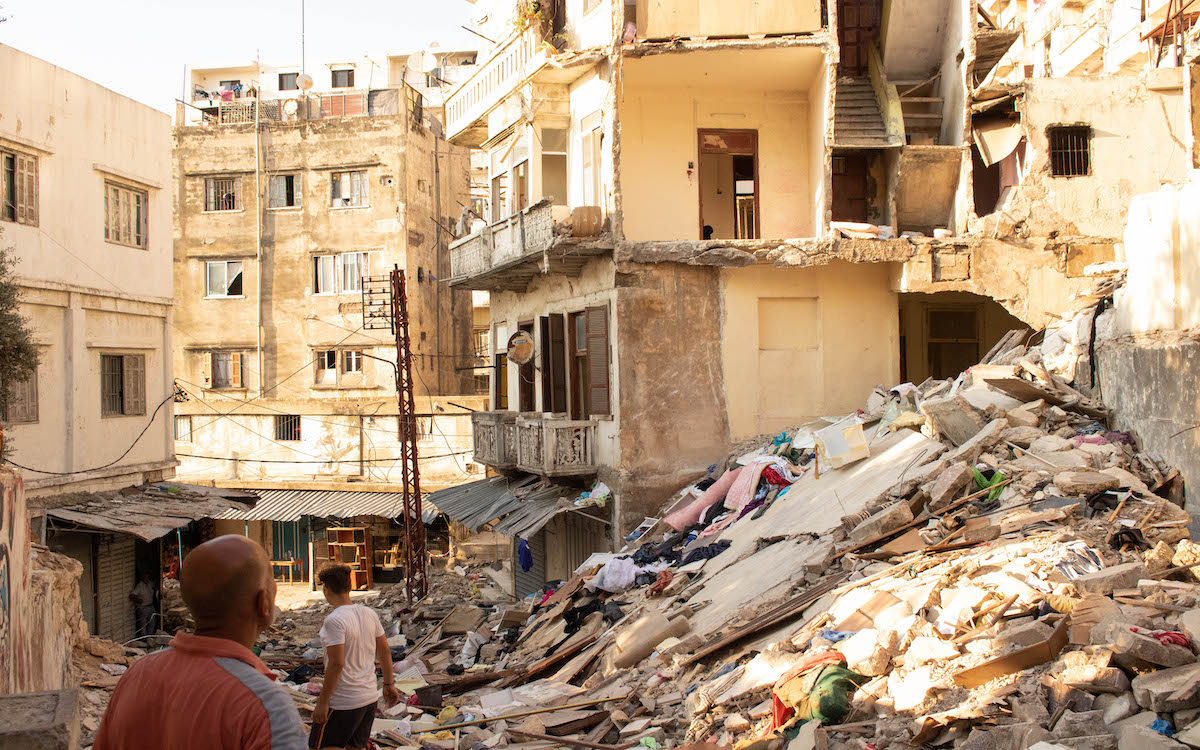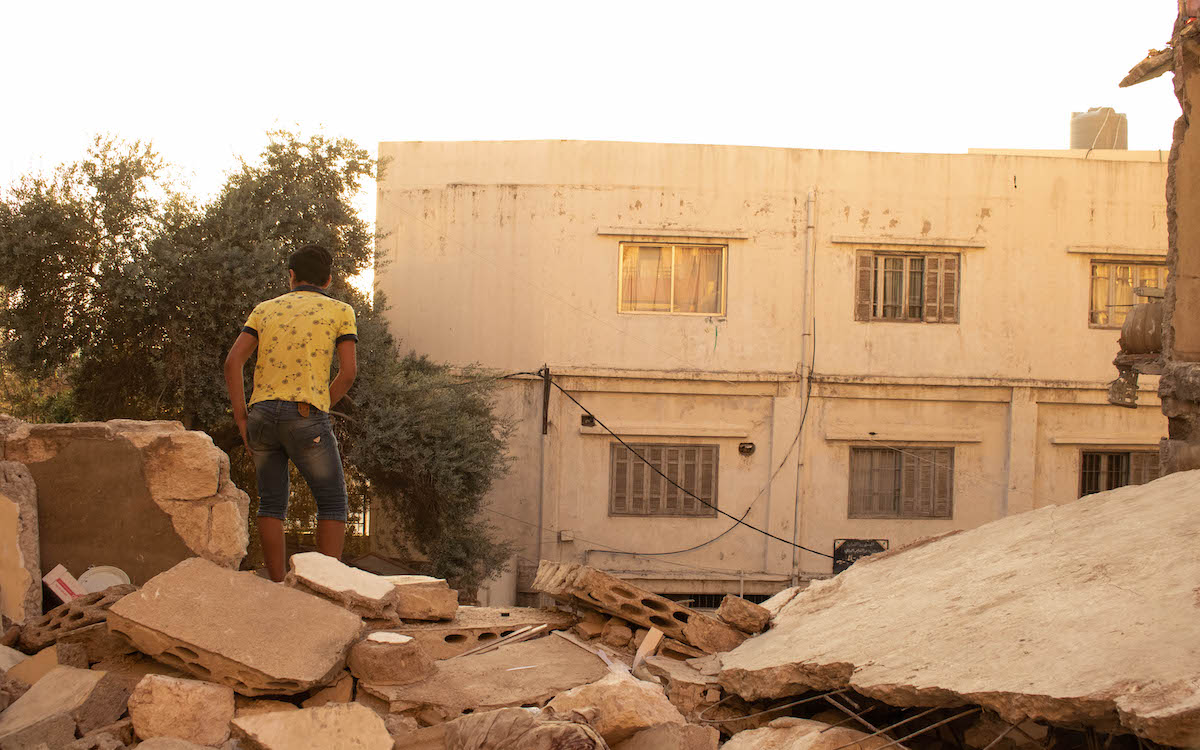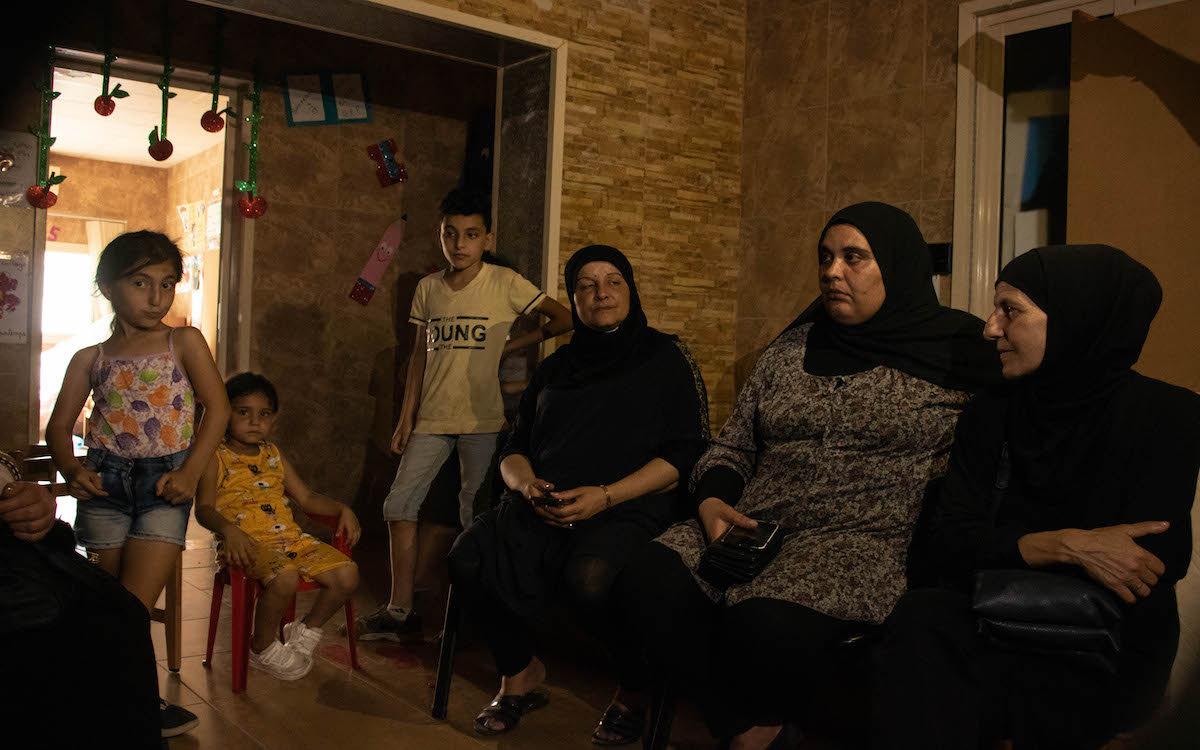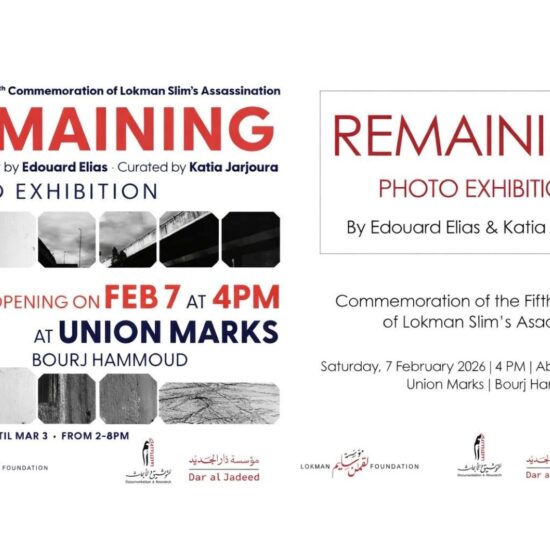
Mustafa Deeko, 6, with his father, Khaled, 38, left his five-year-old sister, Joumana, and his mother at their home on the fourth floor of a building in the Daher al-Maghr neighborhood of Tripoli to visit his aunt’s home nearby and was looking forward to playing with Joumana once they got back.
However, just 20 minutes after they left, Khaled was stopped in his tracks when his phone rang.
“I barely made it to my sister’s house and I received a phone call that the building had collapsed,” Deeko told NOW, tears forming in his eyes as he recalled the evening. “I ran to the scene and found my house demolished. I started screaming and removing rocks.”
As his father searched frantically through the rubble, Mustafa stood in disbelief, facing the remains of his home and his family nowhere to be seen.
He called out for his sister and tried to find her.
But it was too late. By the time rescuers found her, she was already dead. His mother was critically injured and rushed to the hospital for treatment.
The building collapsed suddenly on Sunday, June 26, but it came as little surprise for many of the neighborhood’s residents.
On Friday night and Saturday morning, a massive rain and thunderstorm engulfed Tripoli, damaging the already fragile building.
While the sheer destruction of the building shocked residents, it served as further confirmation for them that many of the buildings that they now inhabited were just one bad day away from meeting the same fate, something that they say they have warned the Tripoli Municipality about before only for the local authorities to do nothing.
According to Mona Fawaz, professor of urban studies and planning at the American University of Beirut and cofounder of Beirut Urban Lab, this is not surprising. Localities throughout Lebanon’s major cities have long failed to take care of low-income neighborhoods, preferring to focus funds on middle and upper-class areas.
“You sort of tolerate them; you accept their presence, but you don’t want to give them rights,” Fawaz told NOW, referring to the residents of the neglected neighborhoods.
“So what’s the best way that you can guarantee that they will not be entitled to the city? By making them live in crumbling buildings in very dilapidated conditions. So, the conditionality of their access to the city is pegged to the conditions in which they are allowed to reside.”

The social contract
Tripoli has long held a reputation as being the poorest and most neglected city in Lebanon, despite it being the country’s second-largest.
Rather, much of the money that went towards rebuilding the country after the war went towards the capital, Beirut, in an effort to attract more tourists.
Even prior to the 1975 civil war, most of the focus was on Beirut, much to the dismay of international and local experts.
“Historically and today, there is an overemphasis on investment that goes to Beirut as opposed to the rest of the country in a very disproportionate, skewed way,” Fawaz explained. “We know that even when they did statistic studies back in the 60s to try and come up with a national development strategy, there was a consistent recommendation from international agencies that came to do studies on national development and local experts that they should deemphasize Beirut.”
Fawaz recalled a story of the US sending water experts to Lebanon during the Cold War to help expand access to water to rural areas throughout the country.
However, when the Lebanese government returned to the experts after they had submitted their proposal, the experts were horrified when the government proposed having the water sent to the beaches in Beirut in order to accommodate tourism. The government argued that the wealth would trickle down to the rest of the country eventually.
If you’re going to allow low-income people to live in the city, you’re going to make sure that the conditions in which they dwell are way below substandard. The conditionality of their presence is maintained.
Outside of these projects, though, there has been little effort made throughout the country to fix low-income areas.
Fawaz says that this is because people coming from low-income backgrounds are not necessarily wanted in these cities, such as Beirut and Tripoli, but their labor is required to perform the jobs that none of the middle and upper-class are willing to do. So, as a result, they are forced to live in rundown buildings and areas in which the government and municipality refuse to invest.
“Land and the urban fabric is basically only seen as a way in which you are going to put intensive financial investment,” she said. “If you’re going to allow low-income people to live in the city, you’re going to make sure that the conditions in which they dwell are way below substandard. The conditionality of their presence is maintained.”
Since there is little movement by the authorities in the neighborhoods, the residents see no need to get permission from the municipality to construct buildings or add extensions to existing buildings, meaning that the buildings are often not up to safety regulations and are at a heightened risk of requiring more frequent repairs or, in the worst-case scenario, collapsing.
Even when it comes to at least monitoring the areas to be aware of the condition of the buildings and if they are at risk of collapsing, Fawaz says that Lebanese authorities more often than not fail to do even this.
“It’s very common across the world that low-income people, when they don’t have access to another land, for them to start adding floors incrementally and it’s very common for municipal authorities to intervene and to say that there is a structural failure and the building is about to fall and to do onsite resettlement of a low-income community,” the urban planner stated.
“Our municipal authorities don’t do anything like that. You have yet to see a municipal authority that decides to go survey a low-income neighborhood or any neighborhood and basically verify public safety issues,” she continued.
For those living in low-income areas, they often do not have any other option but to live in such unsafe buildings. For many, to commute from another town for work in the city every day is unfeasible. As is affording to live in another neighborhood.
But they are living in a time bomb. It is not a matter of if the buildings will come down at some point, but a matter of when.
In Beddawi, a neighborhood of Tripoli home to the city’s Palestinian refugee camp, nearly all of the buildings in the camp are built without permits and the approval of the municipality. For Fawaz, any news of buildings collapsing in the area would be anything but a surprise.
“I’m afraid of a similar scenario [to what happened in Daher al-Maghr] in Beddawi,” she said. “There’s a couple of buildings and I wouldn’t be surprised if you told me that they crumbled. We saw this happen earlier in informal settlements south of Beirut.”
The residents of these areas are clearly uncomfortable with the fact that their homes are deteriorating around them as they eat and sleep.
Around a dozen residents of Daher al-Maghr told NOW that they had informed the Tripoli Municipality about their situation but said that nothing was done to address their concerns, leading to the building collapsing on Sunday.

Consequences
It was just a normal day for 48-year-old Basima Hussein.
She was at home, trying her best to stay cool despite the summer heat and unrelenting humidity when she heard a strange rumbling sound.
At first, Hussein did not think twice about the sound, as the generator that they rely on for electricity made a similar sound when it turned on. But it continued and she realized that the building across from her home was coming down.
“We just saw some bricks falling, and suddenly the building collapsed,” Hussein told NOW.
Quickly, she found the five other people in the house and they fled their own building out of fear that it would also collapse since it also has extensive damage and is in need of repairs.
Now Hussein, like many others who lived either in the building that collapsed or in nearby buildings, is forced to stay at a primary school that has no electricity, relying on battery-powered lights and their phones for light, for shelter. The school is dense with heat due to all of the people crammed into the small facility, forcing them to step outside in the hopes that a cool breeze would come by, all the while having to look at the remainder of what used to be their homes.
It is not just their homes that they have lost, however, as many of those who were forced to evacuate lost everything that they own.
“I lost my home,” Em Rabih, 64, told NOW. “My clothes, I just ran out of there with the clothes I have, my belongings, even my medication. I have been living without meds since the day of the incident. I don’t even know what the names of my meds are.”
The residents of Daher al-Maghr exclusively blame government officials for not doing something about the building earlier and working to help the impoverished citizens.
“The people living in the building tried to reach out to the municipality saying that since you are saying the building will collapse, you need to find us a secure place to stay in so we wouldn’t be in sleeping on the streets,” Abdel Kader Abed, 30, told NOW. “Before two days, when the storm happened, lightning struck and caused damage to the building. They called the municipality to inform them about what happened, and they replied by saying we do not work on Sundays. We will check the building on Monday.”
The head of Tripoli’s municipality, Dr Riyad Yamaq, refused to accept any of the blame for the building collapsing, saying that the municipality had told people that the building was not safe to live in, yet they continued to do so.
“We refuse to blame the Tripoli municipality for any consequences for the collapse of this building, especially since we had restored several houses at our expense and at the expense of good people, and people are witness to that,” Yamaq said. “The municipal police issued warnings to the residents of the necessity of evacuating these ancient or old buildings that are in danger of collapse, but the people were rejecting the eviction process and also refused to restore their buildings due to their inability to do so.”
Suzan Merhi, 37, scoffed at the idea that they should have just picked up their belongings and moved somewhere else as she stood in the doorway of the school that she was now forced to call home.
“We do not have any families to go to, even if some of us have, we cannot stay there. All the spaces are small and cannot accommodate all of us,” Merhi told NOW.
When Yamaq came to the site following the building’s collapse, he was forced to leave due to the anger of the residents because of the municipality’s lack of action.
“The president of the municipality arrived and we just kicked him out because we already tried to contact them before and they didn’t do anything and now the girl is dead,” Merhi stated.
Many residents of Daher al-Maghr do not have anything outside of their homes. Immense poverty permeates throughout the community. Mohamad Nachabe, 62, described the living conditions as “harsh.”
Following the collapse of the building, a source at the Tripoli Municipality, who spoke on the condition of anonymity as they were not authorized to speak to the press, told NOW that they were now going to take action in order to secure some of the buildings in the area, such as by putting up columns to better support the foundation of the buildings, and demolish other buildings that are too dangerous to inhabit.
When asked how many of the buildings in Daher al-Maghr were at risk of collapsing, Abed estimated that around half of them were at risk.
Fawaz argued that this was probably an extremely liberal estimate, but added that given the lack of structural integrity that many of the buildings have since they were built without permits, it was likely that many posed a danger.
I told the president of the municipality, that when a catastrophe happens you say we wish we could have helped before but you just come after.
While walking through the neighborhood, Abed showed NOW the state of the buildings in the area.
Most had large cracks in them in several places. Others were precariously constructed with one home having a balcony only supported by thin wooden planks.
In Beirut, there are many organizations and groups that work to help people reconstruct their homes in the event that they are damaged or falling apart.
This was evident following the August 4 Beirut Port explosion in 2020, when people worked together to reconstruct the heavily affected areas.
Tripoli has had no such luck in receiving aid.
While many residents rely on NGOs for support when it comes to food, there are no real organizations that help them when it comes to maintaining their homes.
Both Merhi and Abed confirmed that no one has come to help them.
The municipality says that they will rebuild the buildings that they demolish so that the people who are displaced as a result are not left homeless, but, given the lack of action by the municipality in the past, Nachabe is not holding his breath that they will follow through on their promises.
“We just hope that they will not break their promise, but I don’t have high expectations,” he said. “They didn’t rebuild the Port of Beirut, so, of course, they will not rebuild anything in this poor neighborhood.”
Despite the risks posed by staying in many of these buildings, residents are planning on staying where they are since they have nowhere else that they can go and since they cannot afford to live in a middle-class area that does not suffer from the same problems that they do.
Merhi hopes that this building collapsing will serve as a wake-up call for the municipality that it cannot continue to ignore the low-income areas and that they need to put more time and effort into ensuring their safety.
“I told the president of the municipality, that when a catastrophe happens you say we wish we could have helped before but you just come after,” Merhi stated.
Nicholas Frakes is a multimedia journalist with @NOW_leb. He tweets @nicfrakesjourno.
Rayanne Tawil contributed to this report.








